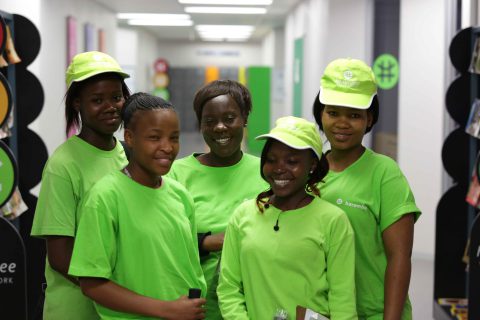CSI
Creating Shared Value
With the inaugural Africa Shared Value Summit having taken place in Sandton earlier this year, awareness about creating shared value (CSV) has arguably never been greater in South Africa. It is no coincidence that Woolworths Holdings is ranked 40th on the Fortune 2017 Change The World list, which recognises the top 50 companies that “are using the profit motive to solve a multitude of societal problems”. Barclays Africa introduced its group-wide Shared Growth strategy last year and the growing significance of CSV is further underscored by the inclusion, for the second year, of a Shared Value category in The Loeries awards, which took place in August. Communications agency DevCom won gold for Sappi Southern Africa’s Abashintshi Social Mobilisation Project. Nando’s was awarded silver for the Nando’s Artists Society career development programme. The chain won a Grand Prix for its art sourcing Nando’s Chicken Run initiative in the inaugural Loeries Shared Value category last year.
However, despite growing awareness of the business model and the important role it can play in simultaneously building profitable businesses and solving social problems, there remains some confusion about what CSV is and what makes it different from corporate social investment (CSI), says organiser of the summit, Tiekie Barnard of Shift Social Development and head of shared value advisory at Genesis Analytics, Ryan Short.
“While the summit was a success and will be held again in 2018 (this time, more closely aligned to the United Nations’ 17 Sustainable Development Goals), we continue to see uncertainty about what CSV is and what makes it different from CSI,” says Barnard, adding that even CEOs concede they have “trouble getting their heads around it”. Moreover, as a judge for the Loeries Shared Value awards, Barnard also noticed that some entries “missed the mark” in terms of meeting the criteria of CSV.
For Short, the confusion is highlighted by the vocation of those who attended the two-day CSV course he led at the Gordon Institute of Business Science for the second consecutive year in August.
“While numbers indicate there is growing interest in the subject – we had a 50 per cent increase in attendance – everyone was either from their companies’ CSI, communications or branding departments,” he says. “CSV is a business strategy, which integrates and builds on CSI. It is about doing things differently, innovating and changing the way you think as a company. It should be inculcated in everything a company does. As such, the ideal people to attend the course are CEOs, CFOs, COOs, and heads of strategy and business development.”
The risk, he cautions, of people from CSI, communications and marketing departments introducing CSV to their companies is that it perpetuates the notion that CSV is a “repackaging of CSI that simply impacts how things are reported and that, while CSV language is used, the business model is not instilled in the company’s strategy”.
So, what is the difference?
Like CSI, CSV is about doing well while doing good. Both topics focus on sustainability and philanthropy. However, whereas CSI comes from a mind-set of responsibility, compliance and charitable giving, and is usually seen as a cost of doing business, CSV is not about redistributing wealth; instead, it is based on finding business opportunities and competitiveness within less than perfect circumstances.
According to its originators, Harvard professor Michael Porter and Harvard Kennedy School of Government senior fellow, Mark Kramer, “corporate shared value is a management strategy in which companies find business opportunities in social problems.”
It is, concur Barnard and Short, a strategy that requires embedding societal purpose at all levels – from corporate-level choices about which businesses to acquire and operate, to business unit or product-level choices about which unmet needs to fulfil. It’s about developing business models that are both successful and improve societal conditions.
Inspiring agents of change
Identifying societal challenges within a company’s sphere of operation and finding ways of addressing these for the mutual benefit of communities and the company are among the first steps of creating shared value (CSV). In 2015, Sappi Southern Africa’s forestry division in KwaZulu-Natal set out to establish what it could do to simultaneously provide communities with opportunities and reduce the number of fires in its plantations.
Research showed high unemployment within communities and expectations that the company would provide more jobs than were possible, thus highlighting a critical need for enterprise development. This resulted in the implementation of a 12-month pilot community engagement and social mobilisation project, which involved the appointment of 18 unemployed youngsters called the Abashintshi (isiZulu for ‘change agents’).
Based on the asset-based community development (ABCD) methodology and with the objective of establishing and helping activate entrepreneurial enterprises among their communities, the Abashintshi were taught how to facilitate life skills and entrepreneurship training, activate the Ifa Lethu Legacy programme with elders, and offer holiday programmes for school children. They also provided Sappi with a new channel of communication, which helped improve the company’s reputation significantly.
The result? 234 small businesses have either been started up or rejuvenated with the assistance of the Abashintshi while fires in the target areas declined by 89 per cent in just two years. The programme has subsequently been extended to
43 communities in KwaZulu-Natal and Mpumalanga involving 88 Abashintshi
“This programme has helped me to be able to communicate with people,” says 26-year-old Sthembiso Dlamini, who sang in the church choir and undertook occasional bricklaying before being recruited as a member of the Abashintshi. “Through the ABCD initiative, I have managed to help a granny grow a field of cabbages and sell it locally. It makes me proud to see how I helped bring dignity and a positive mindset to my community.”
Fellow Abashintshi, Msizi Lugaju engaged local chiefs and, with their permission, called community meetings to brainstorm better use of local assets. “It came as a surprise to people when they realised just how many assets they have in their community that are unused,” he says. “We began looking at all our talents and asked ourselves, ‘What can we do?’ People used to think that the only economic opportunities were to get a job at Sappi, but now they are starting to realise that there are so many other opportunities they can take.”
Preparing youngsters for the workplace
Barclays Africa’s Shared Growth strategy focuses on education, enterprise development and financial inclusion. “We chose these three pillars because they are critical to human development,” says head of citizenship for Barclays Africa, Sazini Mojapelo. “Young people need skills that enable them to secure their future; entrepreneurs need access to opportunity, skills training and capital in order to grow their businesses, create employment and grow the economy; and people need access to reliable and affordable financial services and products. These are areas where we can help improve lives and fulfil our principle of stewardship – leaving the communities where we operate better than when we found them.”
Among the initiatives is Barclays ReadytoWork programme, which provides free education and training programmes, online and in workshops, with accredited institutions. The programme has been rolled out to nine countries and has helped equip more than 205 000 young people with people, money management and entrepreneurial skills.
At just 19 years old, Sowetan, Mokete Motaung is an alumnus of the Columba Leadership schools development programme and is now a ReadytoWork facilitator. “ReadytoWork provides young South Africans with the critical skills they need to find work in the 21st century,” he explains. “I initially came for the training myself and absolutely loved it. When I was asked, I jumped at the opportunity to be trained as a facilitator.”
Among the valuable skills ReadytoWork teaches are, he says, communication, financial literacy and entrepreneurship. “Those are the critical things for the youth, both when it comes to finding or creating work and for managing life,” says Motaung. “Many of these things are not taught at school. For example, the basics of financial literacy are unknown to most school leavers. Communication is also important in getting ahead in your career and private life. When you communicate well, it enables you to take up opportunities and present yourself well in interviews and so on. ReadytoWork gives you these kinds of critical skills.”
Having found his niche in education, Motaung hopes to continue his studies and eventually work as a curriculum developer. “I’d really like to play a role in developing basic education studies that equip school leavers with really useful skills and knowledge so that they can more easily find work or develop it themselves,” he says.
Journeying towards supplier and enterprise development
With its Good Business Journey as the umbrella strategy, Woolworths Holdings says it aims to embed sustainability in every aspect of business and every product it sells. “Our vision is to be one of the most responsible retailers in the southern hemisphere,” says head of transformation, Zinzi Mgolodela. “Our creating shared value (CSV) approach is designed to create long-term sustainability of our supply chain through various mechanisms, including both our enterprise and supplier development programmes, as well as our Farming For The Future programme.”
Among the 48 suppliers involved in Woolworths’ enterprise development initiative
is Cape Town-based K9 Petfoods, which is
part-owned (70 per cent) and managed by Fazielah Allie. In 2014, with more than 17 years experience in the Petfood sector (including interacting with Woolworths), Allie decided to purchase then-struggling K9 Petfoods, and Woolworths approached her to discuss her range and its potential place on the chain’s shelves.
“We discussed how it would be possible for K9 to produce a range of wet pet foods locally to avoid Woolworths having to import product,” says Allie. “For me it meant a secure national outlet and Woolworths decided that K9 was
the kind of business they wanted to include in
their supplier and enterprise development programme.” The involvement included Woolworths providing K9 with a small loan for new equipment, technical support and product development. These days, having begun with 11 staff, K9 employs 48 people, most of whom are black women. The company is currently finalising an increased range for Woolworths.
Another beneficiary of Woolworths’ CSV model is The Clothing Bank (TCB), which, since 2010, has provided unemployed people with skills and opportunities to sustain small businesses selling excess stock and returns donated by retailers.
“Woolworths was the first retailer to come on board,” says TCB co-founder and COO, Tracey Gilmore. “They were our champions and other retailers followed. This ensured that we quickly became sustainable and are now moving towards being 100 per cent self-funded.”
TCB also now includes The Appliance Bank (TAB), which equips unemployed men with the technical and entrepreneurial skills to repair and sell appliances from retail partners. “This not only helps unemployed individuals, but also has a major impact on landfill,” says Gilmore. And the profits made by the men and women supported by TCB and TAB are significant enough to change their lives. For the 2016/17 financial year, TCB’s profit amounted to R29-million. That is an average profit of R3 647 per month per entrepreneur. TAB’s profit was R1,8-million, which is an average monthly profit of R7 120
per entrepreneur.






 Sign-up and receive the Business Media MAGS newsletter OR SA Mining newsletter straight to your inbox.
Sign-up and receive the Business Media MAGS newsletter OR SA Mining newsletter straight to your inbox.